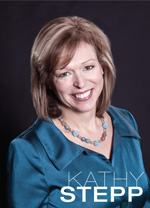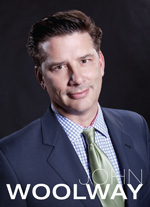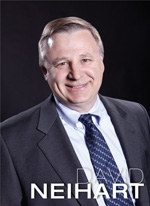
Loyalty means something to Kathy Stepp. Loyalty to family, loyalty to clients, loyalty to her values. Which is one reason her degree from Ohio State is framed in the maize and blue hues of her beloved University of Michigan, where she’d entered college before family relocation diverted her to the Buckeye State. The same value holds in her approach to asset management at the firm she owns with her husband, Howard Rothwell.
“We really have a sense of family with our employees and our clients, and that colors everything that we do,” she says. She offers a bemused assessment of the TV commercial that depicts a stock broker toasting a bride and groom as though he were part of the family: “They don’t do that in real life,” she says of the brokerage, “but we do. We just don’t have that kind of advertising budget. We become family with our clients, and they become family to us.”
It’s a growing family, and for very good reason: Stepp & Rothwell has been cited by AdvisorOne.com as one of the top wealth management firms in the country. It weighed in at No. 150 for 2011, well in the top half of a group that, totaling 371, is considerably more exclusive than even the prestigious Barron’s rankings. With nearly $430 million in assets managed—and fewer than 200 client relationships—the firm’s 15 employees are able to devote attention to clients at levels that Stepp says are almost unheard of for fee-based managers.
Stepp, a rarity in wealth-management leadership as a woman, initially explored a career in accounting. But the need to work through college led her to a Columbus financial planner named John Sestina—better known in financial circles as the father of fee-based asset management. “I started at the bottom,” Stepp says. “I didn’t even know what an IRA was.” Working for Sestina led her to a more appealing perspective on working with numbers.
A trip to visit two sisters in Kansas City prompted relocation here, and she opened the doors of her own firm here on her 30th birthday in 1992. By then, she had a healthy appreciation for what it takes to invest over the long term. “I was around for Black Monday” in 1987, she says, “and you learn a lot of lessons going through this. The big one we’ve learned is that you have to keep your eye on the ball, and that’s the big picture—not just the economy, but what the client is trying to do.”
The financial shock and market swings of 2008 reinforced her belief in the power of close, frequent communication. “It was something we were doing anyway,” Stepp says. “We literally actively meet with all clients at least quarterly, but we sent out bulletins trying to cut through a lot of stuff they were hearing that may not have been true or might have been skewed, to just give them the facts.” Previous experience managing through pronounced market volatility, she said, had taught her that “in tough times, the best thing to do is make sure we didn’t panic ourselves and kept calm, communicate and stayed focused on facts.”

Geology? Yes, John Woolway earned an undergraduate degrees in the study of rocks. His other degree, in business administration, is what got him into financial services, but the connection between the two is easier to make than it might seem: “I started my career as a fixed-income analyst, focusing on insurance-company balance sheets and mortgage-backed securities,” Woolway says. “I found that finance and geology both required in-depth analysis, as things weren’t always what they appeared to be on the surface.”
As president and chief investment officer for Vantage Investment Partners, Woolway brings not only critical-thinking skills, but values handed down early in life. “My parents were my first and best role models I could have asked for,” he says. “They grew up in the Depression, so the values of hard work and saving were instilled into me at a very early age.”
Mowing lawns and bagging groceries helped get him through the University of Iowa, and he followed that experience by earning his MBA at DePaul University in Chicago. He went to work for Chicago Title and Trust Co., then First National Bank of Omaha, before becoming chief investment officer at the Old United Insurance Companies in Merriam, which partnered to form Vantage in 2003. Woolway has been ranked among the Top 100 wealth advisers nationally by AdvisorOne.com (No. 82), with a $350 million portfolio and clients who average nearly $15 million in assets.
That success, though, isn’t all his, he’ll tell you. “I have been blessed with incredible mentors/bosses/partners throughout my career,” he says. “Without some of their guidance, I wouldn’t be where I am today.” One of the most important things he’s learned, especially given the market volatility of recent years, is to stay composed. “Don’t panic,” Woolway says. “The wild swings in the markets over the last few years have created some very good opportunities for my clients.”
But it’s a lot easier to avoid market anxiety if you just dial out the noise, he says. “Other than checking where the futures markets are in the morning, I don’t have much use for financial market info-commercials,” Woolway says. “Clients do call or email from time to time about a certain character or comments they heard that day, but our discussion focuses on the facts as opposed to someone’s opinion that seems to change day to day.”
Being a responsible asset manager, says Woolway, sometimes involves delivering difficult messages. But even then, things work out if the message is based on the right foundation. And that would be? “Trust,” Woolway declares. “The client understands that we’re both sitting on the same side of the table, in essence, we’re partners. Also, I have some very interesting clients from whom I have been able to learn some very valuable life and business lessons.”

To be a good wealth manager, says David Neihart of Wells Fargo Advisors, “you must be willing to swim upstream. It requires that you recommend investments that the client needs, rather than what they want. As a retail broker, this can be difficult at times.”
No more so, he says, than when times are good. “When a market is skyrocketing up, the majority of investors want to buy even though they need to consider selling at least a portion of their portfolio,” he said. That’s why he sees trustworthiness as the bedrock of a successful long-term relationship with a client, and the values that lead to that, he said, start with his personal faith—an element of financial services rarely referenced on the 24/7 cable programming.
“For me, my faith plays a guiding role in contributing towards this trust,” he said. After that, he said, “a very integral part of our worldwide view is that a contrarian approach to investing is the best. When a large majority of investors are convinced of anything—for example, interest rates going up or down—then it is wise to at least consider the likelihood of the opposite occurring. Most people want to be in the consensus with their investing, and end up having very mediocre long-term results.”
His own results for clients helped land him a spot on Barron’s list of the top advisers in Missouri; he manages nearly $375 million in client assets. A Kansas City native who majored in accounting and economics at Westminster College in Fulton, Mo., Neihart was able to enter asset management in large part through one of the best investments he ever made: getting his Barstow High School sweetheart, Wendy, to marry him. Because her income met the family needs, “I decided that if I were going to start a business from scratch, that was the time to do it,” he said. “We did not have children at that time. Investments had always interested me,
and I felt my accounting background was a good foundation.” The business has changed significantly since he started in 1985, he said, and diversification has played a major role: “It no longer just involves stocks and bonds,” he said. “There are a wide variety of investments available to the public which were not even invented when I started.”
Another change he’s witnessed—one not for the better—has been the explosion of financial information through TV and the Internet. “The world craves immediate information packaged in a manner that borders on entertainment,” he said, but because of the incredibly speeds of information flow today, “I think it has made the public even worse investors”. Unlike many wealth managers, Neihart is actually in a position to influence that information flow—at least for anyone with access to his“Money Time” AM radio show on KKOW out of Pittsburg—his contribution to keeping investors grounded in fact, not fear.